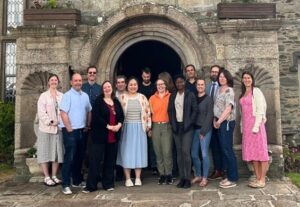
SENISCA was born out of more than 18 years of academic research led by Lorna Harries at the University of Exeter, where Lorna still works as both a Professor of Molecular Genetics and as Founder and CSO of SENISCA.
Her research uncovered brand new scientific knowledge, which is now being developed by Lorna and her team to reverse cell ageing and treat age-related disease with the support of QantX.
“Up to 40% of our NHS budget is spent on elder care because we have an ageing population. Each year that our population lives with the healthcare and social consequences of ageing has been estimated to cost about £38 trillion pounds” Explains Lorna.
“Age is the biggest risk factor for almost every chronic disease. We are looking to treat these diseases and signs of ageing at the cause, rather than treating the consequences after it has appeared.”
We caught up with Lorna to hear her story.

Lorna Harries, Founder and CSO of SENISCA
The start of SENISCA
The business started as a spin-out from an idea that began to form in 2009. “It was a coffee-cooler moment that led to the initial discoveries – one of my colleagues had a range of data from people of all ages, so we took a look to see which genes change the most with age. Over 98% of genes can make more than one product under different circumstances to respond to the needs of the cell. Our work found that the genes that change most as we get older are the ones that tell the genes which specific message to make.”
The process by which different products are made is known as alternative mRNA splicing. The genes that control alternative splicing tell cells which specific product to make, where in the body and when. When these genes stop working, the cells become unable to respond to their environment and this causes stress, and a process called senescence, which is basically ageing at the level of cells.
“I already had a particular interest in these genes”, Lorna continues, “so discovering that they play the most important role in our ageing process was a eureka moment for me. We then spent the next 10 years researching why these genes get switched off.”
Lorna’s research focused on the pathway between what is happening on the outside of the cell, and the messages that are transmitted to the inside of the cell to tell it what to do to cope with the outside environment. This was a shift in how scientists viewed ageing – Lorna was the first one to publish a paper pointing to the importance of these genes in ageing.
“It took 14 attempts for me to get the data published, but as soon as it was, I began getting interest from investors and the commercial sector. Before this I was focused on getting the knowledge out there. The university was extremely supportive and sent me on an Innovate UK funded programme called iCURE, which supported me on my transition from academic to founder.”
Spin-out success
It was here in 2021 that Lorna first partnered with QantX, and initially raised 1.2 million to research how to target these pathways. “We discovered we can target them in two ways – either through naturally-occurring small molecules or through targeted genetics, now known as senotherapeutic interventions,” Lorna says.
These discoveries have led the team to focus on both skin health and targeting age-related diseases.
“You can intervene these pathways at the top using chemicals that can be found in plants. They work together in combination to tackle skin ageing, and this is brand new to the skincare world so this is very exciting,” says Lorna. “You can also target further down the pathway at the level of the specific genes, which is where our new drugs for ageing diseases act.”
Lorna is driven by a passion to support people to age better. She explains: “It’s rare to reach your 80s with just one disease and most people have at least five. Once you get your first common chronic disease then the others follow very quickly.”
Initially the executive team – which has now grown to seven including Sarah Cole as CEO, and Dr Tim Schmidt as Chief Development Officer – along with six talented research scientists are focusing on tackling age-related lung fibrosis.
The disease currently has no cure and leads patients to deteriorate at an extreme rate: most patients die within 2-3 years of diagnosis. SENISCA can help these patients by using short strands of DNA or RNA to interrupt the broken messaging processes and reset the ageing clock in the cells to restore their normal function.
Earlier this year they raised £3.7 million to accelerate their research with AI and machine learning so they can refine their interventions. QantX has invested from the beginning, and Lorna is grateful for their support. She says:
“We’re not based in one of the main biotech hubs, like Cambridge or Oxford. So, for our spin-out to begin where we did it has been so nice to have investors like QantX who get that and have made it their mission to specialise in early-stage funding in this part of the country. They’ve supported us beyond just the funding – helping to bring in the right talent and putting us in front of the right audiences.”
Once they have proven the concept and shown that it works, Lorna hopes the science can be used to tackle all age-related diseases. Watch this space!